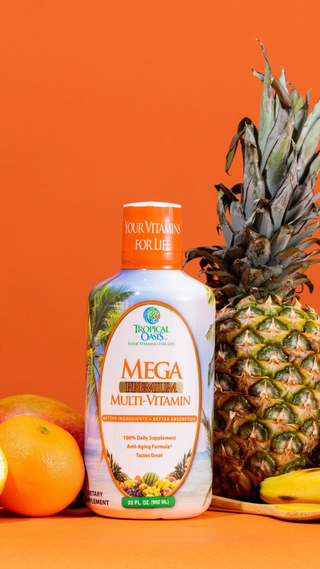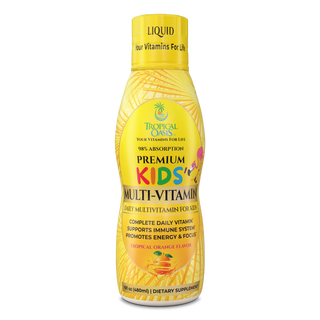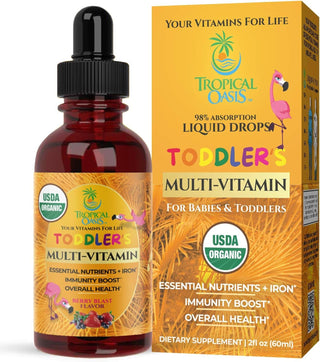Infant Multivitamin With Iron
At Tropical Oasis, we pride ourselves on delivering premium liquid vitamins and minerals that support optimal health and wellness. Our commitment to quality and innovation has established us as a trusted name in the supplement industry.
You’re viewing 1-3 of 3 products
Key Takeaways:
- Iron’s Vital Role: Iron is crucial for an infant’s cognitive development, energy levels, and overall health.
- Supplementation Benefits: Multivitamins with iron help bridge nutritional gaps in breastfed or formula-fed infants.
- Practical Guidance: Learn how to select and administer infant multivitamins with ease and confidence.
What Is An Infant Multivitamin With Iron?
An infant multivitamin with iron is a specially formulated dietary supplement designed to provide essential vitamins and minerals, including iron, to support the healthy growth and development of infants. These supplements are tailored to meet the nutritional needs of babies who may have specific deficiencies or require additional nutrients that might not be fully met through breast milk or formula alone.
Typically, these multivitamins include vitamins such as A, C, D, and E, alongside iron—a crucial mineral for developing red blood cells and preventing iron deficiency anemia. They are often available in liquid form to make them easy to administer to young infants.
Why Is Iron Important For Infants?
Iron is a vital mineral for infants as it plays a key role in their growth and development. It is essential for producing hemoglobin, a protein in red blood cells responsible for carrying oxygen throughout the body. Adequate iron levels are critical for maintaining energy, supporting brain development, and preventing iron deficiency anemia, which can lead to fatigue, poor appetite, and developmental delays.
During the first six months of life, most infants receive sufficient iron from their mother's stores or iron-fortified formula. However, as they grow, their iron needs increase, especially for breastfed infants who may not get enough iron from breast milk alone. This is where infant multivitamins with iron can provide additional support, ensuring they meet their daily requirements.
Why Tropical Oasis Mega Premium Multivitamin With Minerals Is The Best Choice For Your Baby
When it comes to ensuring your infant gets the essential nutrients they need for optimal growth and development, Tropical Oasis Mega Premium Multivitamin with Minerals is a standout choice. This liquid multivitamin is specially designed to provide a comprehensive range of over 100 vital nutrients, including iron, to support brain development, healthy blood production, and a strong immune system. Its liquid form ensures superior absorption, making it more effective than traditional pills or gummies.
Unlike many other supplements, Tropical Oasis is easy for infants to consume and is ideal for filling nutritional gaps, especially during the critical early years. By choosing Tropical Oasis, you're giving your baby the best foundation for a lifetime of health and well-being.

Key Benefits Of Multivitamins With Iron For Infants
Providing multivitamins with iron to infants can offer several benefits, especially for those who may have specific nutritional gaps. Here are the key advantages:
Prevention Of Iron Deficiency
Multivitamins with iron ensure that infants meet their daily iron requirements, significantly reducing the risk of iron deficiency anemia. This is crucial for maintaining healthy red blood cells and supporting oxygen transportation and energy production.
Support For Cognitive Development
Iron plays an integral role in brain development, especially during infancy's rapid growth phase. Adequate iron levels are linked to better memory, learning capabilities, and motor skill development as children grow.
Strengthened Immune System
Vitamins A, C, and D work together to build a resilient immune system, helping infants fight off common infections and illnesses. This is particularly important during infancy when the immune system is still developing.
Improved Energy Levels
Iron facilitates the production of hemoglobin, which is essential for transporting oxygen to muscles and tissues. This contributes to better energy levels, ensuring that infants are active and engaged in their developmental milestones.
Enhanced Bone Growth
Vitamin D in multivitamins with iron helps the body absorb calcium more effectively, a mineral vital for strong bones and teeth. This ensures your infant develops a solid skeletal foundation, reducing the risk of deficiencies like rickets.
When Should An Infant Take Multivitamins With Iron?
The timing for introducing multivitamins with iron depends on the infant's dietary intake, health status, and developmental needs. Here are some common scenarios when supplementation may be recommended:
Breastfed Infants
Breast milk contains only a tiny amount of iron, which may not be sufficient as the baby grows. Around 4–6 months, an infant’s iron reserves—built up during pregnancy—start to diminish, making supplementation a helpful solution to prevent deficiencies.
Premature Or Low-Birth-Weight Infants
Premature babies or those born with low birth weight often miss the critical stage in late pregnancy when most iron stores are accumulated. As a result, they may require multivitamins with iron earlier to support their rapid growth and developmental needs.
Formula-Fed Infants
Many formulas are fortified with iron, but infants who consume less than the recommended daily formula intake may not meet their nutritional requirements. In such cases, multivitamins with iron can help bridge the gap and ensure consistent iron levels.
Infants With Specific Nutritional Deficiencies
Certain health conditions, such as malabsorption issues or dietary restrictions, like vegetarian diets, may lead to iron or vitamin deficiencies. Multivitamins with iron provide an efficient way to ensure these infants receive the essential nutrients required for healthy growth and development.
Choosing The Right Infant Multivitamin With Iron
Selecting the appropriate multivitamin with iron for your infant requires careful consideration to ensure it meets their nutritional needs safely and effectively. Here are key factors to keep in mind:
Consult A Pediatrician
Always start by seeking advice from your child’s pediatrician, as they have the expertise to determine your infant’s specific nutritional needs. They can recommend a product that aligns with your baby’s health, age, and dietary requirements while addressing any potential concerns.
Age-Appropriate Formulation
It’s essential to choose a multivitamin tailored to infants, as these are carefully formulated to provide the right balance of nutrients for their developmental stage. Using a product meant for older children or adults could lead to incorrect dosing or missing critical nutrients specific to infants.
Liquid Form
Liquid multivitamins are ideal for infants because they are easy to administer and allow for precise measurement of doses. They can also be mixed with milk or food, making it convenient for parents and more palatable for babies.
Check For Iron Content
Make sure the multivitamin contains an adequate but safe level of iron, as recommended by your pediatrician. Too little iron might not address deficiencies, while too much can lead to issues like constipation or discomfort.
Other Essential Nutrients
Multivitamins with iron often include complementary vitamins such as A, C, D, and E, which are vital for immune function, bone health, and overall development. Selecting a product with a comprehensive nutrient profile ensures your infant receives well-rounded support.
Quality And Safety
Opt for reputable brands that meet stringent safety and quality standards to ensure the product is free from harmful additives or contaminants. Look for certifications such as GMP (Good Manufacturing Practice) and transparent labeling that clearly outlines ingredients and dosages.
Tips For Administering Multivitamins To Infants
Administering multivitamins with iron to infants can be straightforward with a few helpful strategies. Here are some tips to ensure a smooth process:
Use The Provided Dropper
Most liquid multivitamins come with a calibrated dropper to help measure the exact dosage your infant needs. This ensures precise administration and prevents the risks associated with under-dosing or overdosing, which could impact the supplement's effectiveness.
Incorporate Into Feeding Time
Mixing the multivitamin with a small amount of breast milk, formula, or pureed food can mask the taste and make it easier for your infant to ingest. However, avoid mixing it into a full bottle or meal, as your baby might not consume the entire serving, leaving part of the dose behind.
Choose A Consistent Time
Establishing a daily routine for giving the multivitamin helps ensure consistency and makes it easier for you to remember. Morning doses are often recommended, as they won’t interfere with your baby’s sleep, and they align well with your infant’s active metabolism during the day.
Clean The Dropper
After each use, wash the dropper thoroughly with warm, soapy water to remove any residue and prevent contamination. This simple step helps maintain hygiene and ensures the supplement remains safe for your baby.
Address Any Taste Issues
If your baby dislikes the taste of the multivitamin, try mixing it with a small amount of sweet-tasting liquid, such as apple juice or a favorite puree, as long as it is appropriate for their age. Alternatively, consult your pediatrician for recommendations on other formulations or strategies to make the supplement more palatable.
Read also:
- Liquid Multivitamin For Kids: Choosing The Best One
- Best Multivitamin For Kids: Essential Nutrients
- Calcium Supplement For Kids
Sources:
- Does Your Kid Need a Multivitamin? (n.d.). Cleveland Clinic. https://health.clevelandclinic.org/multivitamin-for-kids
- Martini, L., Pecoraro, L., Salvottini, C., Piacentini, G., Atkinson, R., & Pietrobelli, A. (2020). Appropriate and inappropriate vitamin supplementation in children. Journal of Nutritional Science, 9(20). https://doi.org/10.1017/jns.2020.12
- Junaura Rocha Barretto, Alves, M., & de, C. (2023). Use of dietary supplements by children and adolescents. Jornal de Pediatria. https://doi.org/10.1016/j.jped.2023.09.008
- Elliott, C. (2019). Assessing Vitamins, Minerals and Supplements Marketed to Children in Canada. International Journal of Environmental Research and Public Health, 16(22), 4326. https://doi.org/10.3390/ijerph16224326
Frequently Asked Questions
The recommended daily iron intake for infants is 11 mg for babies aged 7–12 months, according to the American Academy of Pediatrics.
Yes, iron-rich foods for infants include pureed meats (like chicken, beef, or turkey), iron-fortified cereals, and pureed lentils or beans.
Yes, excessive iron can lead to gastrointestinal discomfort or iron toxicity. Always adhere to the dosage prescribed by a pediatrician.
Many brands offer vegetarian or vegan infant multivitamins with iron, using plant-based ingredients suitable for dietary restrictions.
Yes, iron supplements can cause dark green or black stools. This is generally harmless but should be discussed with a doctor if concerned.
Symptoms may include pale skin, irritability, fatigue, slow weight gain, and frequent infections. If these occur, consult a pediatrician immediately.



